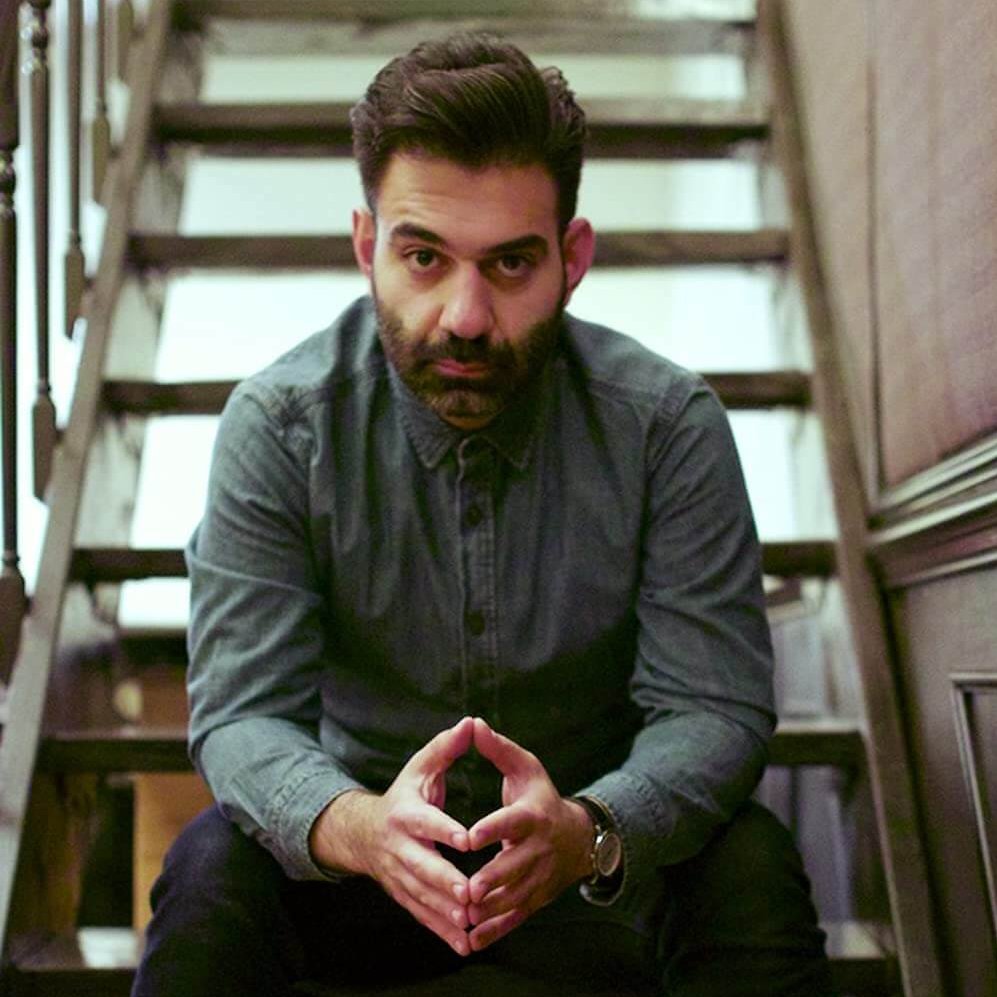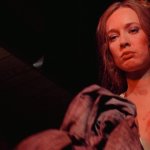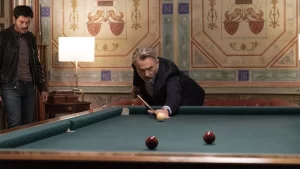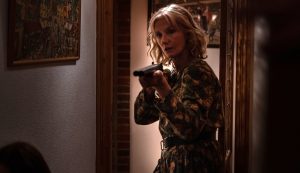Composer Nima Fakhrara is no stranger to action, having scored the likes of The Courier, Danger One, and Becky, but his “suspenseful, vibey score” for Netflix’s Lou–produced by Bad Robot, and starring Academy Award-winner Allison Janney and Jurnee Smollett–might be his biggest yet. The film, directed by Anna Foerster, sees “A mysterious loner living a quiet life with her dog battles the elements and her own dark past when a neighbor’s little girl is kidnapped during a storm.”
For this upcoming cat-and-mouse, action-thriller feature film, Fakhara wanted his score to have the sort of tape-scratch elements found on cassette recordings of the 1980s. Composing a clean and modern score, he ran everything through an old cassette player – recording all his score audio onto cassette tape, and then captured that recording digitally to play around with and find the right kind of ’80s sound he was going for.
We spoke with the composer about all of this and more ahead of Lou‘s debut on Netflix, where it premieres on Friday, September 23rd.
STARBURST: Where are you speaking to us from?
Nima Fakhrara: I’m actually in LA, of all places. I’m here for the Lou premier, which was yesterday and and I’m heading back tomorrow.
Where’s your studio?
In February, we built kind of a small little farmhouse in Connecticut. So now, basically I work mostly out of Connecticut now and it’s pretty nice. I can’t complain. It’s basically the dream that me and the family have had for a while. I get to wake up every morning and write. That was always the point. We’re in the middle of the forest and stuff like that, so, but I get to come back to LA all the time.
We love the fact that you’re in a small farmhouse in the woods, as that seems to dovetail perfectly with the score for Lou. Did it offer any inspiration in terms of being in a similar situation?
I think that’s why they hired me. [laughs] Sure. Absolutely. It was really a really funny thing, ’cause all of this was a two-year plan for us to move to Connecticut and Lou kind of came about in February, early February kind of thing. So it was really funny. When I was starting this score, I was in the middle of the woods during a New England winter. It was very similar to Lou’s life. I was basically stuck in a cabin and just writing music for Lou. It was really fun. It was some of my most fun I’ve had in a project. It all worked out.
This isn’t your first foray into action. You did the score for Becky a couple years ago, among other. Is there something a appealing about what action allows? You got to do some fun stuff with this score, but it feels like you go to go a little bit further than standard action tropes.
Well for this one, it was a little bit different, ’cause we are dealing with a Netflix/JJ Abrams movie. It’s not an indie action film that I could throw the kitchen sink at it and then we could figure out what it is, but the beauty of this film became that I was able to experiment and they wanted something unconventional.
They didn’t want an action movie–and this was the entire team, including JJ, [director] Anna Foerster, Jon [Cohen, producer], Hannah [Minghella, producer]–everybody at Bad Robot and Netflix, and that was very refreshing to hear as well as to be asking for. The job for me in in that moment for Lou was to how to create the convention realities with the unconvention that I usually like to mess around with.
I was capable of giving that to them and to keep everybody happy and to make sure that I do my job correctly, but still do it some sort of a fresh take of it. How do we do that? That was the challenging part about it.

If it’s an action movie, you’ve gotta get blood pumping, but Lou is not your typical action film.
Oh, no. We have probably–without giving away anything–three, four action scenes. You’re watching Alison Janney kick ass and it’s pretty fucking cool to see that. That was the fun part. It was like, “How do I create this momentum within the entire score without us feeling that it’s another action film?”
To that end, that’s what really made us want to talk to you–the idea that you recorded all of this onto cassette tape. Is it correct to assume it was inspired a bit by the Walkman that the daughter, Vee, has during the early parts of that movie?
Yeah. It was, kind of. You know, the whole movie takes place in the ’80s. I didn’t wanna age the score or write it in the style of the that time period, because we’re dealing with a modern character with modern kind of things and I was like, “Huh, how do I do this?” and then cassettes came into play.
I recorded every single element on a cassette before it went to Pro Tools and even when we recorded at the Village, everything was being recorded on a cassette before it was coming into Pro Tools, so you get this really interesting warmth and texture. I was able to play with all of this, literally just taking the cassette tapes and just stretching them, making it move faster and then throwing all of this into synthesizers. I wasted a lot of cassettes, but it was so much fun.
It was a big challenge ’cause you’re dealing with tapes and now you gotta figure out how to deal with tapes and how to take the take from this one and make it this one. It was a big challenge in that sense, but the texture, it just gives you the warmth of the time period and how it was recorded. One of the other things I made sure to do in the sense of the way it was being recorded at the time was just smaller ensembles and intimate sounds, and then just everything is in your face. Extreme panning and things like that just kind of brought it alive into the cassette world.
You alluded to this earlier in Lou is a Bad Robot Netflix movie, starring Allison Janney. This is not low profile in any way, shape or form, but it also is a period piece. What are your trepidations going into this?
At the end of the day, I’m a composer and I’m a servant to film. It doesn’t matter $700 million worth of story or if it’s $150,000 worth of story. At the end of the day, I’m just scoring to the characters and idea of what these characters are going through and commentating on it, whether it’s a small little animation or a big movie, the fun part becomes is that how do you do something fresh every time? And how do you approach it with a sense that, “You’re still doing your job.” Also, there is–you are dealing with your idols.
When you hang out with JJ Abrams, it’s like, “Oh, cool. This is JJ.” It’s just a different world, but at the same time, at the end of the day, I’m still a composer. I’m still that little kid that just likes to write stories and likes to make music. I guess that the recklessness and my child’s kind of mentality just comes into play as well within the music of itself. At the end of the day, it’s just music.
Lou hits Netflix on Friday, September 23.






